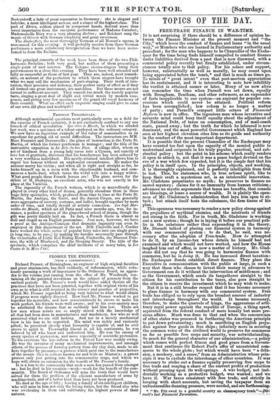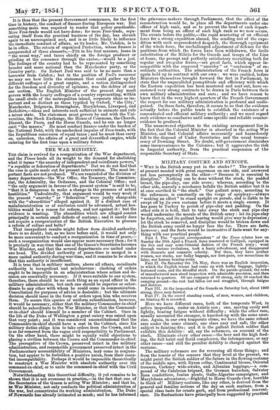TOPICS OF THE DAY.
FREE-TRADE FINANCE IN WAIL-TIME.
IT is not surprising if there should be a difference of opinion be- tween the Finance Minister at the present moment and "the City," which loves the conduct of finance and loans "in the usual way," or Members who are learned in Parliamentary authority and precedent; for the man who happens to be Chancellor of the Exche- quer for the time being finds himself compelled to conduct finance under liabilities derived from a past that is now disowned, with a commercial policy recently but firmly established, under circum- stances totally new to that policy. For his solace and support, however, substantially as well as morally, he may count upon being appreciated before the tomb,' and that is much as times go. To minds of "great intent" even that post-mortem appreciation has its sustainment, and it is interesting to note how infallibly the verdict is attained sooner or later. Many of us now alive can remember the time when Parnell was set down, equally with Brougham, Bentham, and other reformers, as an expounder of facts inapplicable to our system—an aspirant for popular con- cessions which could never be attained. Political reform has been accomplished ; law reform is no longer a matter of party; and Parnell's compact little octavo of Financial Reform is now in office. The ingenious man whose inventive and accurate mind could busy itself equally about the adjustment of the National Debt, of taxes on consumption, and of mail-coach seats, passed away; but the truth for which he laboured is now dominant, and the most powerful Government which England has seen at her highest elevation cites him as its guide and authority in the conduct of the most important department.
It is possible that the present Chancellor of the Exchequer may have counted too fast upon the capacity of the monied public to understand and cooperate in his truly popular, practical, and sub- stantial policy ; but the point in his scheme which really renders it open to attack is, not that it was a peace budget devised on the eve of a war which few expected, but it is the simple fact that his policy is in itself open. In the principles objects, and working, it is thoroughly explained, and is perfectly intelligible from first to last. This' for statesmen who, in true artisan spirit, like to keep their craft a mysterious art, is an intolerable innovation. Mr. Gladstone perpetuates no myth ; he preserves to finance no sacred mystery ; claims for it no immunity from human criticism ; advances no mystic arguments that taxes are benefits, that consols are blessings, or loans a source of wealth. It is plainly the open- ness of Mr. Gladstone's administration that lays him open to at- tack ; but attack itself tests the substance, the firm tissue of his plan.
This openness was necessary to render a new policy strong against the prejudices of mythical enemies, and the mistrusts of friends not strong in the faith. For in truth, Mr. Gladstone is working out a new system ; though he is laying it before our practical pub. ho in the substance rather than expounding it in the theory. Mr. Disraeli talked of placing our financial system in harmony with our commercial system : to do that, he said, was ne- cessary after the adoption of Free-trade. How lie attempted to do it, by an Income-tax whose details he himself had not examined and which would not have worked, and how the House laughed him out of office, is now a matter of history. Mr. Glad- stone did not say that he was going to harmonize finance with commerce, but he is doing it. He has increased direct taxation: the Exchequer Bonds establish direct finance. They place the Executive in communication with the public at large, in such a way that those who choose to invest their money in advances to Government can do it without the intervention of middlemen ; and so the Government, which sends its taxgatherer straight to the citizen for his contribution to the taxes, also goes straight to the citizen to receive the investment which he may wish to make.
But it is in a still broader respect that it has become necessary to place finance in harmony with our commercial system. Free trade has obliged us to rely upon the broadest sources of industry and interchange throughout the world. It became necessary, therefore to make tho quarrels of kings, the aggressions of arbi- trary royal power against the republic of Europe, a thing apart, separated from the federal conduct of more homely but more pre- cious affairs. Much was done to that end when the concurrence of other states was procured in furthering the American principle to put down privateering; much in sacrificing an English prep- dice against free goods in free ships ; infinitely more in securing the common voice of the civilized world to preserve for commerce as far as possible free scope and security, war notwithstanding. So much for the general character of our administration,—a policy which comes with perfect fitness and good grace from a Govern- ment that continues Sir Robert Peel's offer of unrestricted com- merce to the whole globe ; but which would have been "a delix- sion, a mockery, and a snare," from an Administration whose prin- ciple it was to exclude the interchange of other countries. It was necessary to strike out a finance equally preserving free scope to free trade and reaping a share of the current profits of production without pressing upon its well-springs. A war budget, not inci- dentally working as a protective budget, was wanted; and we have it. War taxes consistent with free trade and strictly in keeping with short accounts, but saving the taxpayer from an nnbusinesslike dunning pressure, were needed, and are forthcoming: * "Mr. Pitt owed to a grateful country an eleemosynary tomb."—Dis- radi's last Financial Peroration. It is thus that the present Government commences, for the first time in history, the conduct of finance during European war. But something more was required to render that policy practicable. Mere Free-trade would not have done; for mere Free-trade, sepa- rating itself from the practical business of the day, has shrunk again to an unrecognized sect, and is as little likely to influence the immediate conduct of affairs, as its leader, Mr. Cobden, is to be in office. The return of organized Protection, whose finance is compounded of three elements,—Pitt in his first manner, loans in the usual way," and taxes chiefly on the foreign producer or grinding at the consumer through the excise,—would be a jest. The feelings of the country had to be represented by something broader and more national than the Manchester party, or the Country party. Sir Robert Peel was said to be no more than a borrower from Cobden ; but in the position of Peel's successor we may see how little the statesman that could gather up the different suffrages of a great empire, and a nation distinguished for the freedom and diversity of opinions, was the debtor of any one section. The English Minister of the present day must govern with the hearty suffrages of a country representing, within the small circle of the metropolitan island, corporate ideas so im- portant and so distinct as those typified by Oxford, "the City," Manchester, Belgravia, Birmingham, llarylebone, Liverpool, and Berkshire,—ideas and interests each sufficient to animate and rule a minor state. The statesman must govern by and with the Uni- versities, the Stock Exchange, the House of Commons, the Church, Dissent, the Peers, and the Horse Guards, and he can no longer omit "the masses." He must conduct finance under the burden of the National Debt, with the unchecked impulse of Free-trade, with the Republican concession of equal taxes ' • and he must thus carry on, unbroken the affairs of a great and diversified empire, while entering for the first time upon a military future.



























 Previous page
Previous page